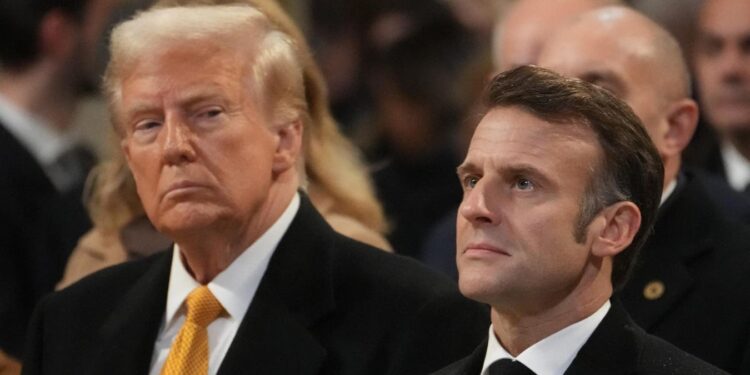President Trump looks on at French President Macron during a recent visit to Paris for the reopening … [+] of Notre Dame.
POOL/AFP via Getty Images
Once again, Donald Trump is pulling the United States out of the Paris Agreement, leaving the U.S. as the only major emitting nation not part of this critical treaty. At a time when global warming has already surpassed 1.5°C, the decision couldn’t come at a worse moment. Wildfires are raging across California, extreme weather is escalating, and the world is staring down tipping points that could reshape our planet irreversibly. Beyond the climate consequences, this move also sets back American business and leaves the U.S. more isolated as the low-carbon energy transition accelerates elsewhere.
The U.S. as a Climate Outlier
The U.S. is the world’s largest historical emitter of greenhouse gases and, today, the biggest oil and gas producer. With that legacy comes responsibility. This decision is not just a denial of that responsibility; it is an abdication of America’s role as a world leader in addressing one of humanity’s greatest challenges. Climate change is not a problem that respects borders, and global challenges demand collective action. By exiting the Paris Agreement, the U.S. sends a dangerous signal: if the world’s wealthiest and most influential nation will not act, why should others?
Emerging economies, which face the difficult balance of development and decarbonization, are watching closely. For countries in Africa, Asia, and Latin America, where millions still lack access to reliable electricity, the message from the U.S. undermines efforts to create global consensus on clean energy. Without the U.S. at the table, it becomes exponentially harder to convince these nations to commit to the deep emissions cuts needed.
By stepping away, the U.S. also loses a critical opportunity to shape the global climate agenda, allowing others—most notably China and the EU—to fill the leadership vacuum. This retreat doesn’t just harm America’s reputation; it cedes influence over the rules, innovations, and markets of the clean energy future to its competitors.
Regulatory Chaos Hurts Businesses
Viewed purely in economic terms, the withdrawal from Paris will be a hit to American businesses. In today’s globalized economy, fragmented climate policies create confusion and cost. Take the European Union’s Carbon Border Adjustment Mechanism (CBAM), which will penalize imports from countries without strong climate policies. American exporters—already competing with foreign rivals—will face tariffs and barriers when doing business in markets that demand climate accountability.
Companies thrive on stability. Major shifts like the energy transition require long-term planning and patient capital. Whether they are building solar farms or modernizing grids, uncertainty around policy makes it harder to attract investment. For an administration that claims to champion American manufacturing and jobs, creating this kind of chaos is self-defeating. It’s no wonder even ExxonMobil has lobbied Trump to stay in the Paris Agreement.
Losing the Race for Green Tech
A utility-scale solar array. Similar ones are likely to be producing ever more of the world’s energy … [+] in the years ahead.
NurPhoto via Getty Images
Renewable energy sources, particularly solar and wind, have become the most cost-effective means of electricity generation globally. Overall investment in the low-carbon energy transition continues to surge, last year hitting nearly $2 trillion. China led the world in that investment with nearly 40% of the total.
Without coordinated federal leadership, the U.S. risks losing more ground to countries like China, which have established dominance in supply chains for critical technologies such as solar panels and batteries. The absence of clear federal support leaves American companies to navigate this transition alone, while competitors abroad benefit from cohesive national strategies. This leadership gap threatens not only America’s economic future but also its ability to influence the global energy transition on its own terms.
A Planet on the Brink
The melting Greenland ice sheet. A highly visible symptom of a climate changed world.
Getty Images
We are approaching critical thresholds for the planet. Record-low sea ice in the Arctic, disruptions to ocean currents, and intensifying natural disasters are all stark warnings. Events like the Los Angeles wildfires have caused billions in damages—with loss estimates as high as $200 billion. Climate change acts as an amplifier on many natural disasters in both their frequency and their severity.
Economists have long warned of the “free rider” problem in international agreements. If the U.S.—the wealthiest nation—refuses to commit, other nations may justifiably feel that their own climate commitments are in vain. Collective action stalls, and we risk triggering climate tipping points that could lock us into runaway warming.
What’s Next?
Across America, there are points of hope: states like California and New York, along with hundreds of U.S. companies, are still committed to the Paris goals under the We’re Still In coalition. The inevitable transition to cleaner energy will continue. But without federal coordination, climate and transition efforts will be more fragmented and less effective.
This is bigger than partisanship or any single administration. The future of the American economy is at stake. Planet last is not America first. The clock is ticking on climate change. Right now, Trump is fiddling as Los Angeles (and the world) burns.
Source link : https://www.forbes.com/sites/davidcarlin/2025/01/21/planet-last-is-not-america-first-trumps-paris-exit-is-a-mistake/
Author :
Publish date : 2025-01-20 23:27:00
Copyright for syndicated content belongs to the linked Source.











